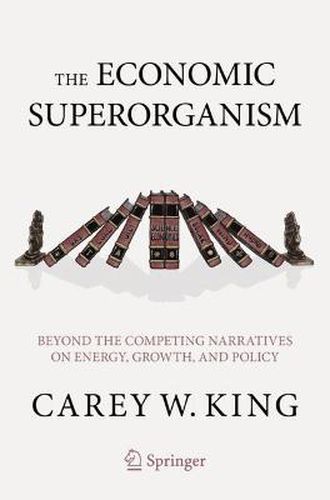Readings Newsletter
Become a Readings Member to make your shopping experience even easier.
Sign in or sign up for free!
You’re not far away from qualifying for FREE standard shipping within Australia
You’ve qualified for FREE standard shipping within Australia
The cart is loading…






This title is printed to order. This book may have been self-published. If so, we cannot guarantee the quality of the content. In the main most books will have gone through the editing process however some may not. We therefore suggest that you be aware of this before ordering this book. If in doubt check either the author or publisher’s details as we are unable to accept any returns unless they are faulty. Please contact us if you have any questions.
Energy drives the economy, economics informs policy, and policy affects social outcomes. Since the oil crises of the 1970s, pundits have debated the validity of this sequence, but most economists and politicians still ignore it. Thus, they delude the public about the underlying influence of energy costs and constraints on economic policies that address such pressing contemporary issues as income inequality, growth, debt, and climate change. To understand why, Carey King explores the scientific and rhetorical basis of the competing narratives both within and between energy technology and economics.
Energy and economic discourse seems to mirror Newton’s 3rd Law of Motion: For every narrative there is an equal and opposite counter-narrative. The competing energy narratives pit drill, baby, drill! against renewable technologies such as wind and solar. Both claim to provide secure, reliable, clean, and affordable energy to support economic growth with the most benefit to society, but how? To answer this question, we need to understand the competing economic narratives, techno-optimism and techno-realism. Techno-optimism claims that innovation overcomes any physical resource constraints and enables the social outcomes and economic growth we desire. Techno-realism, in contrast, states that no matter what energy technologies we use, feedbacks from physical growth on a finite planet constrain economic growth and create an uneven distribution of social impacts. In The Economic Superorganism, you will discover stories, data, science, and philosophy to guide you through the arguments from competing narratives on energy, growth, and policy. You will be able to distinguish the technically possible from the socially viable, and understand how our future depends on this distinction.
$9.00 standard shipping within Australia
FREE standard shipping within Australia for orders over $100.00
Express & International shipping calculated at checkout
This title is printed to order. This book may have been self-published. If so, we cannot guarantee the quality of the content. In the main most books will have gone through the editing process however some may not. We therefore suggest that you be aware of this before ordering this book. If in doubt check either the author or publisher’s details as we are unable to accept any returns unless they are faulty. Please contact us if you have any questions.
Energy drives the economy, economics informs policy, and policy affects social outcomes. Since the oil crises of the 1970s, pundits have debated the validity of this sequence, but most economists and politicians still ignore it. Thus, they delude the public about the underlying influence of energy costs and constraints on economic policies that address such pressing contemporary issues as income inequality, growth, debt, and climate change. To understand why, Carey King explores the scientific and rhetorical basis of the competing narratives both within and between energy technology and economics.
Energy and economic discourse seems to mirror Newton’s 3rd Law of Motion: For every narrative there is an equal and opposite counter-narrative. The competing energy narratives pit drill, baby, drill! against renewable technologies such as wind and solar. Both claim to provide secure, reliable, clean, and affordable energy to support economic growth with the most benefit to society, but how? To answer this question, we need to understand the competing economic narratives, techno-optimism and techno-realism. Techno-optimism claims that innovation overcomes any physical resource constraints and enables the social outcomes and economic growth we desire. Techno-realism, in contrast, states that no matter what energy technologies we use, feedbacks from physical growth on a finite planet constrain economic growth and create an uneven distribution of social impacts. In The Economic Superorganism, you will discover stories, data, science, and philosophy to guide you through the arguments from competing narratives on energy, growth, and policy. You will be able to distinguish the technically possible from the socially viable, and understand how our future depends on this distinction.